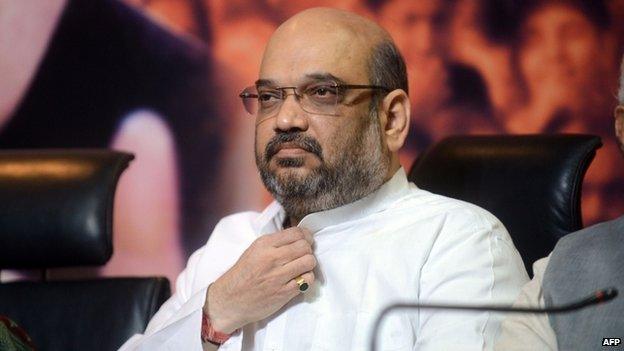Indian media: BJP-Shiv Sena's long partnership ends
- Published

Reports say BJP chief Amit Shah's talks with Shiv Sena leaders 'failed' to save the alliance
Media in India say the upcoming assembly election in the western Maharashtra state has become a "four-way contest" after the break-up of two important political alliances.
The Bharatiya Janata Party (BJP) on Thursday announced the end of its 25-year-old partnership with the regional Shiv Sena party.
The alliance reportedly ended after the two Hindu nationalist parties failed to agree on a seat-sharing deal.
"The end of the BJP-Shiv Sena alliance after a 25-year partnership is, without a doubt, one of the biggest political shockers this year," says the First Post, external website.
The Deccan Chronicle, external says the break-up is likely to cause a "political storm" in Maharashtra ahead of the assembly elections.
Some analysts feel the BJP wanted to play a major role in the state, but the Shiv Sena "was in no mood to play the junior partner".
"Buoyed by the Lok Sabha (parliament) results in which the BJP-Sena alliance won 42 of the 48 seats, BJP upped the ante and demanded 135 seats which the Sena was not willing to give. Sena responded saying it would leave only 119 seats it had contested earlier but later agreed to concede a few more seats," says a report in the Economic Times., external
On the same day, the Nationalist Congress Party (NCP) also decided to end its alliance with the Congress party.
The two are currently running the state government as allies.
"The 15-year-old Congress-NCP alliance in Maharashtra broke up today [Thursday] with the regional party deciding to contest next month's assembly polls on its own and pulling out of the government, setting the stage for its fall," says another report, external in the paper.
Some experts feel the state will see a bitter campaign because of the break-up of the two alliances.
The FirstPost urges readers to "prepare for a very bitter - and dare we say entertaining - three weeks before polling starts in Maharashtra".
Manufacturing hub
Moving on to other news, newspapers and websites are praising Prime Minister Narendra Modi's "Make in India" campaign which aims to turn the country into a global manufacturing hub by cutting red tape and making it easier for companies to do business.
"The "Make in India" campaign is as much an invitation to domestic and foreign companies as a promise to rectify everything that has kept the country at almost the bottom of World Bank's 'ease of doing business' index," reports the Hindustan Times, external.
"There's no denying that Indian industry - the manufacturing sector in particular - desperately needs a big push. The time is also right," the paper says in its editorial.
Echoing similar sentiments, The New Indian Express, external says that the campaign "holds considerable promise of taking the economy on a sustainable high growth path".
It adds that the "timing of the launch of the initiative is significant" because it comes ahead of Modi's US visit, where he will be meeting CEOs of several Fortune 500 companies".
Media are also upbeat about Mr Modi's five-day visit to the US and hope it will start a new chapter in Delhi-Washington ties.
"India-US ties have many things going for it… The visit is expected to yield deliverables like the joint development of weapon systems, but the real measure of success would be if both leaders come away with a clear understanding of what they need to do to impart some momentum to bilateral ties," says the Hindustan Times, external.
And finally, the combined death toll in the flood-hit states of Meghalaya and Assam has reached 75, reports the CNN-IBN website, external.
Heavy rains have been battering Assam and Meghalaya since Monday, with floods damaging bridges and sweeping away roads and houses.
BBC Monitoring reports and analyses news from TV, radio, web and print media around the world. For more reports from BBC Monitoring, click here. You can follow BBC Monitoring on Twitter, external and Facebook, external.